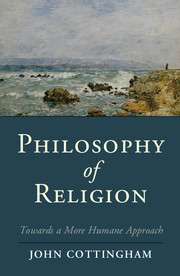5 - Misfortune and Misery
Published online by Cambridge University Press: 05 September 2014
Summary
Misère de l'homme sans Dieu…Félicité de l'homme avec Dieu. (‘Wretchedness of humanity without God; happiness of humanity with God.’)
Pascal.The Demise of Teleology?
The philosophy of religion, as was pointed out in our opening chapter, cannot function properly as an isolated specialism but sooner or later must inevitably concern itself with the grand synoptic question of what kind of ‘worldview’ or overall picture of reality we are to adopt. The arguments of Chapter 4 have underlined that the theistic worldview is of a cosmos that is fundamentally benign: a cosmos where the natural world reflects a goodness and beauty stemming from the divine source of all reality, where our human moral impulses orient us towards an eternal and objective moral order, and where the deepest fulfilment of our human nature lies in responding to the imperatives of love and justice.
This is more than a ‘theory’; it is a kind of joyful affirmatory vision, which is a source of inspiration and hope for the believer. It is not something to be accepted or rejected as one might accept or reject the theory of plate tectonics, or a theory of the causes of the Napoleonic wars, but something that has an impact on every aspect of one's life. If it is a true vision, it confers a deep sense of meaning and purpose in life; if it is false, it is the most pitiable delusion. Any philosophical examination of religious belief must take account of these facts: it is no use pretending that the issues involved are not ones in which we have the deepest personal and emotional stake.
- Type
- Chapter
- Information
- Philosophy of ReligionTowards a More Humane Approach, pp. 98 - 119Publisher: Cambridge University PressPrint publication year: 2014

